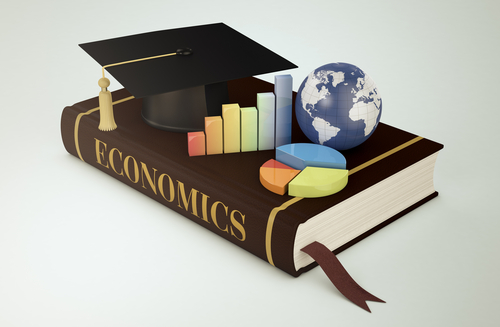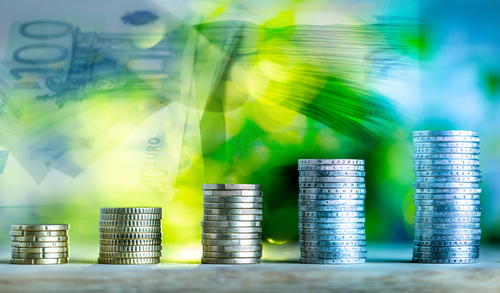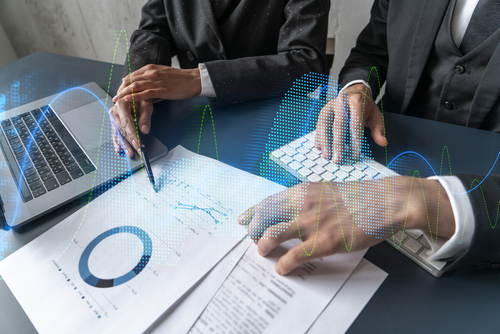
In an ever-widening world of business and trade, those who make decisions impacting families, countries, nations and even the world need expertise. This proficiency goes beyond dabbling in the stock market or starting a business. It takes into account the inter-related issues that drive the global economy such as which nations (or even neighborhoods) have resources and which do not, how resources are utilized and exchanged and the impact of these factors on human relationships. The people who study and assess these issues are economists.
A Master of Economics Degree in economics may help graduates find employment in the government, with multinational corporations, in business or in higher education. The American Economic Association regards the degree as a necessary step for higher level studies. Earning a master’s degree in economics typically requires two years of post graduate study in microeconomics and macroeconomics, econometrics and quantitative analysis.
A Definition of Economics
Investopedia defines economics as a “social science concerned with the production distribution and consumption of goods and services.” As a social science, it is interested in human behavior regarding these areas. In other words, economics looks at what causes people to make certain decisions about how to allocate the resources they have.
Economics assumes that decisions will be made rationally to achieve the best outcomes. Under that assumption, economists think about things like efficiency, labor, trade and other issues. They form models and use theories that help them create incentives for better utilization of resources.
History of Economics
Economics has existed for many years, but under different names. Producers have always wondered how to make a product or perform a service more efficiently and in a more cost-effective way. Vendors have always pondered how to attract more consumers. Governments have always explored how to exploit their resources while not depleting them.
The Greek farmer Hesiod in the eighth century B.C. wrote that if people didn’t manage materials, labor and time efficiently, the result would be a scarcity. That goes to the point of economics. Later, in 1776, a Scottish philosopher named Adam Smith wrote a book titled “An Inquiry Into the Nature and Cause of the Wealth of Nations.” In that book, he said that human wants would always exceed their means. Though pessimistic, that is also economics.
Today, more than just an observation, economics is a science that seeks to understand and achieve efficiency in satisfying human needs and wants.
Gaining an Understanding of Microeconomics

Microeconomics courses teach students various approaches to organizing and allocating resources that are basic mechanisms in an economic system. Utility theory and the law of supply and demand are examined in class along with other basic concepts. The production function is explored in order to examine its relationship to cost theory and short run output.
Students learn about the returns to scale and the ways in which they affect long run production and associated costs. Understanding the outcomes of pricing decisions in real world situations helps students learn methods that cope with varying market conditions. Microeconomics analyzes issues that affect agricultural production, poverty, the use of energy, the world’s food supply, environmental pollution and the distribution of income.
Microeconomics focuses on how consumers and companies make decisions. That means looking at single companies, a single governmental agency, families or even at individuals. Economists in microeconomics ask questions like why people value different goods differently. They also study how people react to changes in those values or prices and how collaboration and cooperation affect decisions made about labor and the production and pricing of goods and services. One of the tools microeconomists use is “Game Theory” which is a series of mathematical models used to understand how people (termed “players” ) come to decisions about interdependent issues.
Studying Macroeconomics
The basic concepts of macroeconomics include the determination and measurement of large scale issues such as business cycles, national income, budget deficits, aggregate supply and demand, fiscal policy, exchange rates, balance of payments, and the national debt. The Red Carpet Broadcast states that the study of macroeconomics is essential for students who want to understand the way that economies work.
Students learn about economic problems that are typically related to income and output, price levels and employment. As a branch of economics that focuses on the structure and performance of an entire economy, it balances the study of microeconomics that focuses on individual businesses and consumers.
Macroeconomists study overall economies of countries and continents, national and international economic systems and geographical or even global economies. One of the primary areas of interest is the economic cycle, which is how economies progress through changes between growth and recession. There are four stages in this cycle.
Expansion
This is a period of rapid growth. Interest rates are usually low and production rates are high. In this stage, the potential for inflation is high.
Peak
In the peak stage, the system has achieved its maximum growth. Cracks, or instabilities appear in the system that must be corrected.
Contraction
This is the period of correction. Growth slows, unemployment rates rise, prices level out, and the economy stagnates.
Trough
The economy “tanks,” and then slowly begins growing again.
Additionally, macroeconomists look at foreign trade, governmental financial policies such as tariffs, unemployment rates, changes in the gross domestic product and other indicators. The two areas of economics are interconnected (in fact, macroeconomics arises out of microeconomics), but they use different methods of study.
In their study of economic systems, microeconomists and macroeconomists look at primitivism, feudalism, capitalism, socialism, communism, and other systems.
Incorporating Econometrics in a Study Program
The study of econometrics helps students find practical applications for academic knowledge by providing tools that can extract meaningful information about economic policies from existing data. Sources of information come from economic and business data that, along with statistical measures, can provide answers to questions that relate to matters of quantity. Cities may use econometrics to estimate the reduction in burglaries that may result from an increase in street lights, and a merchant may need to know how an advertisement on television affects increase in sales. Courses help students translate academic theories into practices that may help clients increase profitability.
Measuring with Quantitative Analysis

Quantitative analysis expands on concepts studied in econometrics by focusing on measurable quantities. Students who earn a Master of Economics degree need to know how to evaluate the impact of wages and earnings, revenues and market share on the operation of a business. Students learn how to generalize results from valid data samples for applications to larger populations. Quantitative analysis provides an objective way to sort, classify and measure data to predict reliable results.
Finance VS Economics
At times, these terms are used interchangeably. If you have a degree in finance, can you become an economist? If you have an undergraduate degree in economy, can you leverage your program into a finance master’s program?
Economics looks at the big picture, studying economic systems and decision-making behavior about resource management. Finance is the use of tools and research methodology to manage money. Although the two are certainly inter-related they are different careers. You can become an economist with a finance degree, but it will require taking additional courses such as psychology and other social science offerings. The same is true of leveraging an economics degree toward a graduate degree in finance. The two disciplines have some overlap, but there are enough differences to require some additional study to go from one to the other.
Economics Degree Programs
Master’s economy degrees are viewed as either terminal degrees or as preparation for doctoral programs. According to an article on the American Economic Association website, often students are awarded a master’s degree after completing a designated part of a doctor’s degree program. Students who intend to earn a Ph.D. in Economics usually are interested in doing research. If students earn the master’s degree as a terminal degree, they will usually be required to write a thesis. The degree programs have different names according to the schools that offer them, although the MBA programs with economic specializations are broader programs and incorporate several disciplines. Some degree offerings that can lead to a career as an economist are:
• MBA in Economics
• MBA in Social Impact
• Master’s in Behavioral Economics
• Master of Science in Applied Economics
• Master of Arts in Economics
• Master of Science in Finance and Economics
• Master of Science in Financial Economics
• And others.
There are also many joint degrees pairing economics with another compatible discipline. Examples are a MS in Economics/ MS in International Relations and an MS in Economics/ MS in Management.
Difference in Master of Arts Degrees and Master of Science Degrees
There is a debate over whether economics is a scientific discipline that would fit in with STEM designations, or whether it is a social science. It is listed in one department at some universities and in another at other schools. As noted, Investopedia defines it as a social science. Even within economics degrees, however, there is a difference.
A Master of Arts in Economics is a program that focuses on the behavioral side of the discipline. Most learning in the program is accomplished through lectures or discussions. Programs usually can be completed in two years or less.
The MBA in Social Impact is a degree that uses the principles of economics to rectify inequities in society. Focuses are entrepreneurship social design in business. In other words, the issue of consumer incentives is qualified by socio-economic factors.
A Master of Science in Economics is a more research and mathematically-oriented program. Learning takes place through lab research and evaluation. This is a two-year program as well, but may take longer because it requires a thesis which can comprise six credits or more including an oral defense.
Additionally, the MBA in Economics is a program that is not as mathematically rigorous as the MS in Economics because it is an applied business program and economics is one application ( although in the specialization it is the main one).
Curriculum in an Economics Master’s Program
In addition to the courses in econometrics, statistics, quantitative analysis, psychology and other courses in economy, electives can be used to tailor specializations. Some of these are: health economics, labor economics, experimental outcomes, industrial economics and others. Master’s programs, with the exception of dual degrees, usually can be completed in two years or less.
Careers in Economics

One economics blog said the problem with finding economist jobs is they don’t say, “wanted: Economist.” Instead, the jobs are for research consultants, consumer researchers and other designations. The blogger noted that jobs were often for an “analyst to study the consumer reaction to the new Wendy’s chicken sandwich,” and other similar descriptions. Still, searching economist openings onBureau of Labor Statistics lists the median income for economists as $105,020. The projected job growth rate is 14 percent, which is much greater than average. States which employ the largest number of economists are Texas, Illinois, Pennsylvania, New York, California and Virginia. The US government employs many economists at all levels.
Graduates of economics master’s degrees are equipped to handle management-level problems of human resource management in many scenarios from typical business environments to preservation and utilization of wetlands and achieving racial and social equity in communities of differing demographics through business. That means if the degree program does not address the area where students want to work, they can add courses or even dual degrees to tailor the career to their needs. Human behavior is the unifying aspect of economics programs.
Graduates who have a solid foundation in economics can provide essential guidance for businesses and all levels of government. Earning a Master of Economics degree is not easy, but it provides access to challenging and rewarding employment.
Related Resources:
- 5 Benefits of a Finance Degree with a Minor in Economics
- How Are Finance and Economics Related?
- What is a Master of Financial Economics Degree?
- What is the Difference Between a Master’s in Finance and a Master’s in Economics?
- 20 Most Affordable Online Finance Bachelor’s Options
- 30 Scholarships for Finance Majors
- The Top 30 Best Master of Finance Degree Programs
- Top 10 Affordable Master’s in Finance Online Degree Programs
- 50 Best Online Master of Finance Degree Programs
- Top 50 Most Affordable Online MBA in Finance Degree Programs
